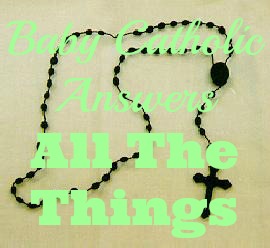Wow. It has been a very long time since I wrote my last Baby Catholic Answers All the Things post. This was supposed to be a regular feature! I’m sorry.
Here’s what happened: I got a question from my friend Liz that threw me for a loop a bit (back in, *ahem*, August). I kind of knew the answer, but I wasn’t sure if my answer was the whole answer, and Google was not helping me find the whole answer very easily, and then once I did find the whole answer, I couldn’t manage to get the post written in a way that I liked. And I didn’t want to write it wrong, because referring to myself as the Baby Catholic who Answers All The Things is a lot of pressure!
So I didn’t write it at all.
And even though I sent a message to my friend Liz giving her the answer, I felt like I shouldn’t just skip it and keep doing other BCAATT posts without answering it here too (though I did do a few posts after getting THE QUESTION). So. Radio silence from Baby Catholic for (*gulp*) four months.
How’s that for a lengthy explanation?
Anyway. In spite of how long it took me to finally get around to it, I am not one to shy away from a challenge. This question and this post have been in the back of my mind for months. Today, I shall answer the question that derailed me for a while, but will not defeat me.
What was it you ask? This:
“What is the difference between the Catholic Church and the Orthodox? Or, when people refer to Orthodox Catholics are they simply implying more devout Catholics (like Orthodox Jews)?”
Now, you may wonder why this stumped me. I think most Catholics, including me, know that the Orthodox Church is a different thing, separate from the Roman Catholic Church but similar. Often referred to as the Eastern Orthodox Church, though it is also called the Orthodox Catholic Church, it split away from Roman Catholicism in the East-West Schism of 1054. I learned about this in RCIA last year and also by reading Catholicism for Dummies.
Easy answer, right? So why in the world did this fluster me so much?
Well, I thought I remembered reading something in Jennifer Fulwiler’s memoir, Something Other Than God about how she and her family had found an orthodox Catholic church to attend that they felt was a good fit for their family. I looked through the book, but I couldn’t find the page to reference. However, she mentions in this post her comment to her husband during one Mass, “I think we’re orthodox,” and then she received help from a reader to find an “orthodox parish” to attend. Anyway, because of all this, I was pretty sure that the answer to Liz’s question was “The Roman Catholic Church and the Orthodox Church are separate but similar, AND “orthodox” is also a way of referring to more strict Catholics.”
However, when I tried to learn more about orthodox Catholicism, I came across the Orthodox Catholic Church of America, which is a whole different thing, not affiliated with the Roman Catholic or the Eastern Orthodox Churches. I couldn’t find much about orthodox Roman Catholic practices. I was frustrated.
Finally, I managed to string together the right phrase in a Google search to find some of what I was looking for. From my results, I read about the Orthodox Roman Catholic Movement, led by some priests who didn’t agree with the changes made to the Mass and the Church after Vatican II. There were many changes that came after Vatican II, and I don’t know all of them, but a big one was the way the Mass was celebrated. Before Vatican II, the Mass was almost always celebrated in Latin, and the priest stood between the congregation and the altar, consecrating the bread and wine with his back to the people of the parish. This is called the Tridentine Mass or often just the Latin Mass.
Now, here’s where I get a little unsure. As I understand it, the powers that be in the Roman Catholic Church say that it’s fine to still perform this Latin version of the Mass, and I assume this is considered an orthodox practice. I’m not sure if there are other Roman Catholic parishes that would be considered “orthodox” but don’t conduct the Mass in Latin. My guess is yes, but I could not find any definitive information about just what makes a parish “orthodox,” or if there even are any rules. It seems as though this is not an official label placed on any segment of the Catholic Church. I suspect that orthodox parishes are more conservative and hold more strictly to the laws of the Church.
Just thinking about the parishes in my town, I can say that there are some that are likely considered more orthodox than others. Our parish for example sometimes includes more modern music in our liturgy, especially at the teen Mass. And up until a few weeks ago, we did not have a tabernacle in the main sanctuary of the church (it was in a small side chapel). Our church also looks more modern, and sometimes at the end of Mass the people involved in planning parish activities come up to the front and do silly skits or wear costumes while making announcements. Probably not terribly orthodox, but lots of fun for our family, and never going against any Church rules. I’ve never been to a Mass at a different parish in our town (other than Miss’s school Mass), so I can’t say for sure, but I’ve heard that some of the other parishes tend toward being more old school, though I don’t know if that’s orthodox or not.
So, what I’ve come up with for a final answer is this:
1. The Roman Catholic Church and the Orthodox (or Eastern Orthodox) Churches are similar but separate.
AND
2. There are also some Roman Catholic churches that are more orthodox in their practices, though I am not sure exactly what would constitute calling a given parish “orthodox.” Perhaps they have the Mass in the Latin Rite. Probably their music mostly consists of traditional hymns, sung by a choir. Maybe parish members dress more conservatively and some might even wear chapel veils for Mass. Most likely they didn’t have a woman dressed in Mardi Gras garb dance up to the front of the church to announce the parish’s Mardi Gras dinner event next Tuesday in a weird accent (intended to sound Cajun?). Or maybe it isn’t really any of these things but simply a more firm adherence to all the teachings and rules of the Church and the pope (if anyone knows a better answer to this part, please share it!).
In my opinion, we are all part of the same church family, whether we attend an orthodox parish or not, whether we prefer the Mass in Latin or English. I love being Catholic, and I like seeing all the ways our Faith is practiced in accordance with the laws of the Church and under the guidance of our pope.
I’m sorry it took me so long to write this post. Send me more questions, and I promise I won’t take so long next time!



Very interesting – thanks for sharing!